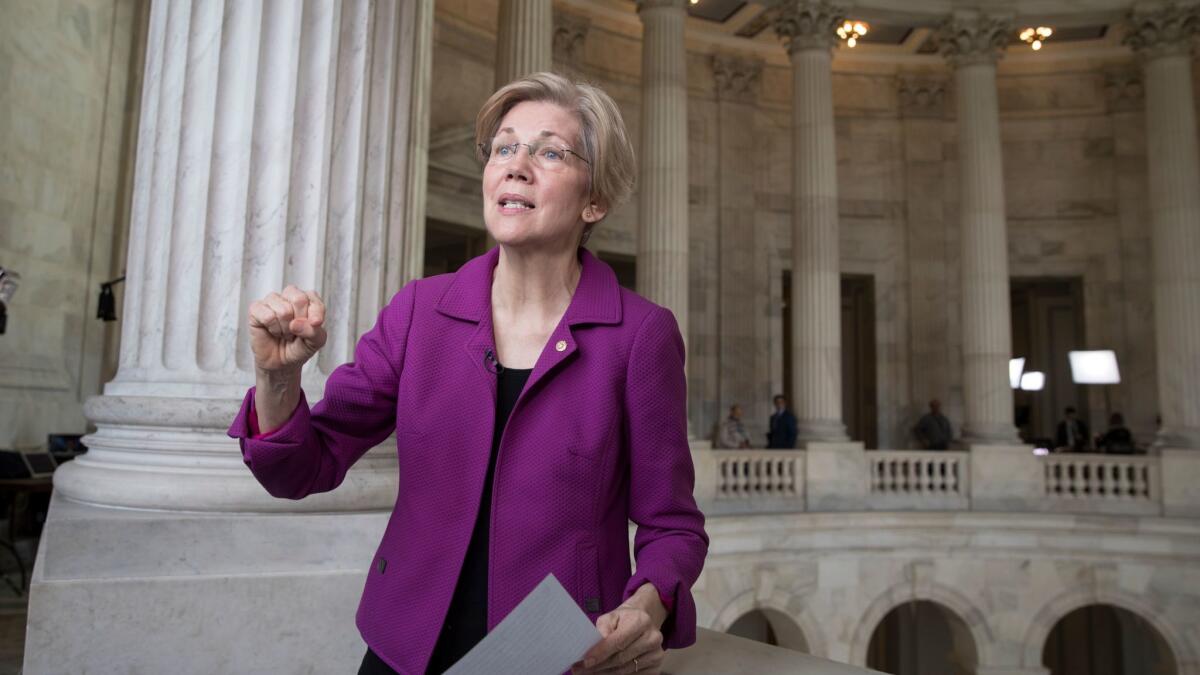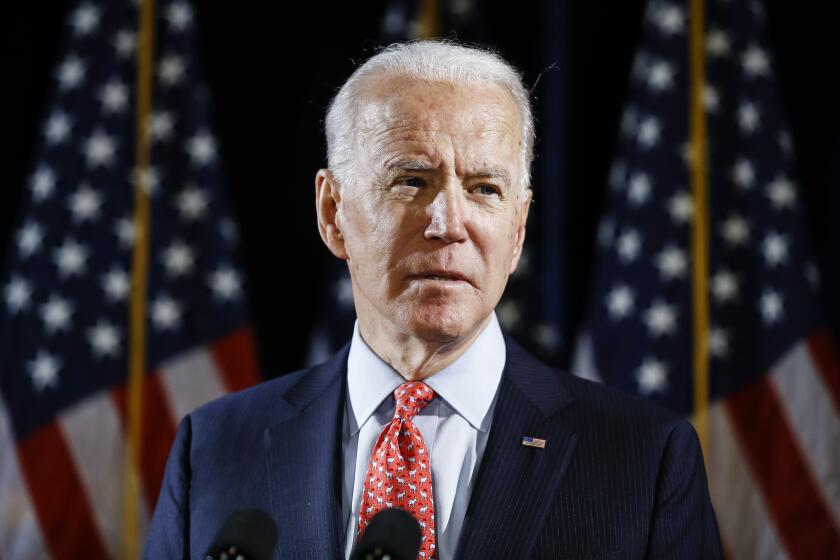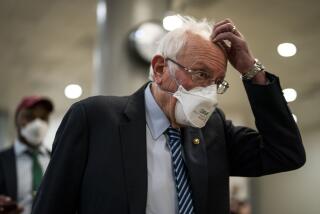Billionaire Michael Bloomberg would face a steep climb in the 2020 presidential race
Michael R. Bloomberg is flirting once again with a run for president, but all signs point to a steep challenge for the billionaire and former New York City mayor if he makes a late entry into the race for the Democratic nomination.
At a time when some Democrats are yearning for a new generation of leaders, Bloomberg, 77, would be among the oldest contenders, wedged between Vermont Sen. Bernie Sanders, 78, and former Vice President Joe Biden, 76.
Bloomberg is a former Wall Street investment banker who would be joining the race when a top concern for many Democrats is growing wealth and income inequality.
His 12-year mayoral record could also make him unpopular among some of the party’s core constituencies, especially African Americans turned off by his support of police “stop and frisk” tactics. A federal judge struck down the policy in a 2013 ruling that found the city was violating the constitutional rights of minorities.
“He’s got a mountain to climb here,” said Stuart Rothenberg, a nonpartisan campaign analyst. “It’s not to say he can’t climb it. But it’s not as though Elijah is coming to run for the Democratic nomination. He ought to be treated as a kind of longshot candidate who has some assets, but is a long way from jumping into this race and suddenly becoming the front-runner.”
In the latest USC-Dornsife/Los Angeles Times poll, only 4% of Democratic voters were dissatisfied with their choices in the primary contest.
Bloomberg’s move to get on the Alabama primary ballot by the Friday deadline keeps his options open. He plans to submit papers next week for Arkansas’ nominating contest.
The former mayor “would be able to take the fight to Trump and win,” Howard Wolfson, a senior advisor to Bloomberg, said Thursday on Twitter. He noted Bloomberg had spent more than $100 million to help elect Democrats to Congress in last year’s midterm election, when they gained control of the House.
“We now need to finish the job and ensure that Trump is defeated — but Mike is increasingly concerned that the current field of candidates is not well positioned to do that,” Wolfson tweeted.
Trump mocked Bloomberg in remarks to reporters outside the White House on Friday, noting they’ve known each other for years and that a campaign by the former mayor would hurt Biden in the Democratic contest.
“There’s nobody I’d rather run against than little Michael,” Trump said.
Bloomberg had announced in March, after spending time in early-voting states, that he was ruling out a run. He said he was “clear-eyed about the difficulty of winning” the nomination in a crowded field.
Since then, the contest has narrowed, with Sanders and Massachusetts Sen. Elizabeth Warren vying for support among the party’s most progressive voters. Biden has struggled to maintain his lead with moderates, with Pete Buttigieg, the mayor of South Bend, Ind., emerging as a popular alternative.
Bloomberg has resurfaced less than three months before voting begins in the first nominating contest in Iowa on Feb. 3.
Jeff Link, a longtime Iowa Democratic strategist, jokingly referred to last weekend’s big party bash in Des Moines, which drew 13 White House contestants.
“I don’t remember anyone chanting, ‘We need more candidates! We need more candidates!’” said Link, who is neutral in the Democratic race. “People are in the process of striking candidates off their list. Nobody wants more options.”
The field is down to Joe Biden now that Bernie Sanders ended his presidential campaign. Here is the Democrat heading for a battle with President Trump.
Wolfson conceded Friday that other Democrats “already have a big head start” in Iowa and the three other earliest states to hold nominating contests, New Hampshire, Nevada and South Carolina. He suggested Bloomberg would start “on an even footing” in the Super Tuesday contests in California and other states on March 3.
Party leaders in Iowa and New Hampshire said they were disappointed by Bloomberg’s plan to bypass their states.
“New Hampshire and other early state voters are some of the most engaged voters in the country,” said Ray Buckley, New Hampshire’s Democratic chair. “They ask tough questions that prepare the candidates for what’s to come in the general election.”
Bloomberg’s biggest asset is money; Forbes estimates his net worth at $52.4 billion. But even with an unlimited budget for advertising, he could still be excluded from Democratic debates if he fails to meet the increasingly high polling and donor thresholds.
The prospect of a Bloomberg candidacy was not warmly received by his rivals. Warren, who has often spoken out against billionaires using their personal wealth to finance campaigns for president, welcomed Bloomberg to the race with a tweet linking to her “calculator for the billionaires” to figure out how much they would owe under her tax on the wealth of Americans with fortunes above $50 million.

Bloomberg opposes Warren’s plan. “I think the Constitution lets you impose income taxes only, so it probably is unconstitutional,” he said in February in New Hampshire.
Tom Steyer, a San Francisco hedge-fund billionaire in the Democratic race, taunted Bloomberg on Friday. “If Michael Bloomberg decides to support a wealth tax, I welcome him to this race,” Steyer said. “If not, it’s very clear that he should not be the Democratic nominee.”
Sen. Amy Klobuchar of Minnesota took offense at Bloomberg’s suggestion that nobody in the field was fit to defeat Trump. “I don’t buy that and I don’t think you do either,” she said to a crowd in Iowa.
One of Bloomberg’s biggest challenges would be his demographic profile.
“Older white male billionaire and former Republican — I think that pretty much covers the gamut of challenges that he will face to get the nod for the nomination,” said Christine Sierra, co-author of “Contested Transformation: Race, Gender, and Political Leadership in 21st Century America.”
Bloomberg has maintained he could overcome initial resistance to his candidacy, pointing to his three mayoral victories in a city where whites are a minority.
In 2001, Bloomberg left the Democratic Party to run as a Republican for mayor of New York City. He won the election in the aftermath of the Sept. 11 terrorist attacks and served three terms. In the middle of his tenure, in 2007, he registered as an independent, then in October 2018 he rejoined the Democratic Party.
The ideology that Bloomberg most closely represents — socially liberal, but economically relatively conservative — is popular in elite circles in the U.S., but distinctly unpopular among other Americans. An analysis of polling data by the nonpartisan Voter Study Group in 2017 indicated that such voters make up about 4% of the U.S. electorate.
Bloomberg is well known as an opponent of the tobacco and soft drink industries. He approved New York’s ban on smoking in bars and restaurants, but his attempt to outlaw large soft drinks was overturned in court. His foundation has spent hundreds of millions of dollars to curb tobacco use in the developing world. He also has poured money into campaigns to promote gun control and fight global warming.
In 2016, Bloomberg made elaborate preparations to run for president as an independent, but abandoned the idea after deciding he had no path to victory in a three-way race against Donald Trump and Hillary Clinton. He denounced Trump in a well-received speech at the Democratic National Convention and has since described him as a dangerous and incompetent president.
Bloomberg, who grew up in the Boston area and earned a master’s degree in business administration at Harvard Business School, worked in investment banking at Salomon Brothers on Wall Street before he founded Bloomberg LP, the information technology and media company that produced his personal fortune.
Times staff writers Mark Z. Barabak, David Lauter and Melissa Gomez contributed to this report.
More to Read
Get the L.A. Times Politics newsletter
Deeply reported insights into legislation, politics and policy from Sacramento, Washington and beyond. In your inbox three times per week.
You may occasionally receive promotional content from the Los Angeles Times.












